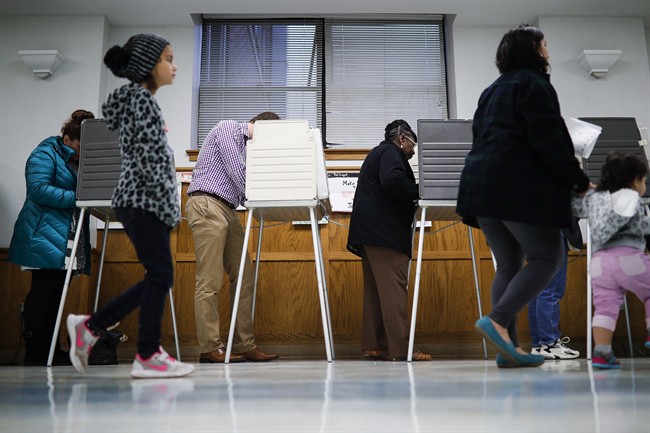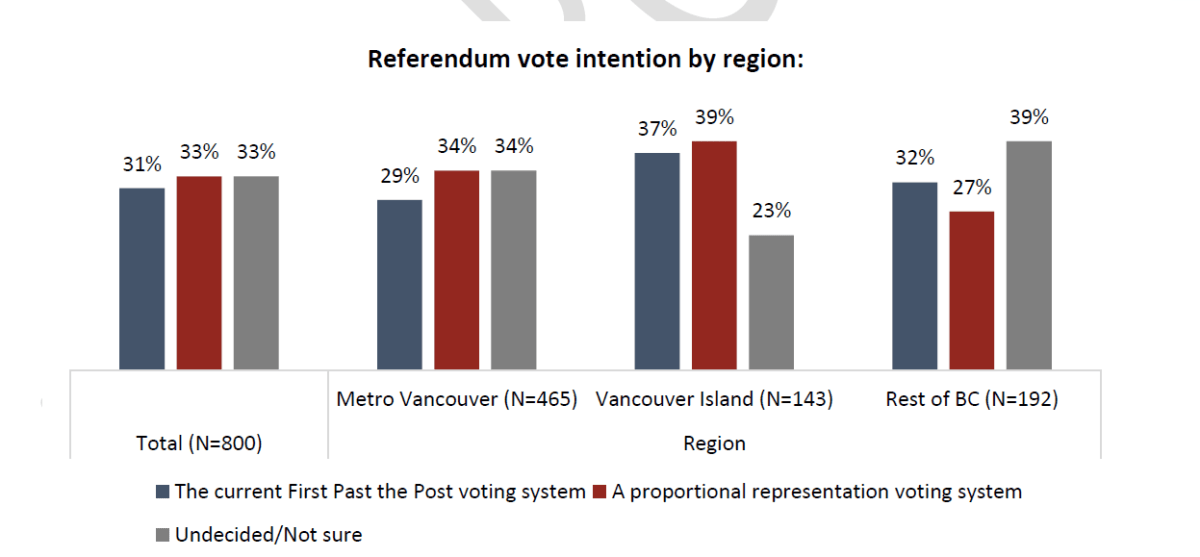A new poll reveals division and uncertainty among British Columbians with just weeks to go before voting begins in a referendum on changing the way the province elects politicians.

B.C. will vote by mail-in ballot from Oct. 22 to Nov. 30 on whether to adopt a form of proportional representation (PR), or to keep the current first-past-the-post (FPTP) system of voting.
The survey, conducted by the Angus Reid Institute, found that 33 per cent of British Columbians support the change to PR, while 31 per cent oppose it. A further 33 per cent remain undecided.
Support was more solid among FPTP backers — 56 per cent of whom said they were certain of their choice — than among PR supporters, among whom 45 per cent were certain.
Only eight per cent of people said they likely wouldn’t vote, while a further 25 per cent expressed some reservations.
“There’s a lot of room for the pro-PR side and the pro-FPTP side to persuade a significant number of people who say they intend to vote but really have not made up their mind which way they’re leaning,” said Angus Reid Institute executive director Shachi Kurl.
Kurl said that’s because people are split on the benefits of switching: a clear majority (61 per cent) believe a PR system would actually increase voter turnout, but nearly half (48 per cent) said they’re concerned it would lead to more minority governments.
WATCH: Electoral reform referendum question subject of fiery legislature exchange

Age, education, party affiliation key drivers
The survey found three key factors driving whether British Columbians supported changing or keeping the current voting system: party affiliation, age and education.
A full 57 per cent of BC Liberal voters said they would vote to keep the FPTP system, with just 16 per cent saying they’d vote for PR.
Among NDP voters, 50 per cent supported PR, while just 19 per cent supported FPTP. Among Green voters, 46 per cent supported switching to PR, and just 17 per cent supported keeping FPTP.
It also found a deep divide among age groups.
READ MORE: BC Liberals call PR referendum a ‘rigged game’, call for more information on proposed systems
Among those aged 55 and over, 45 per cent supported the current FPTP system, while just a quarter backed PR.
Support for changing the system was more pronounced among younger voters — 35 per cent of those aged 35-54 backed PR, versus 24 per cent who supported the current system.
Support for PR was strongest among millennials, with 44 per cent backing change, versus 18 per cent supporting the current system.
Half of people with a university degree supported PR, while 21 per cent would keep the current system. People with a high school diploma or lower split 39 per cent for FPTP, versus 22 per cent for PR.
WATCH: Poll finds most British Columbians support proportional representation

Kurl said those divisions could end up playing against each other.
“We tend to see likelihood to vote in a couple of different demographics. So the older you are, the more likely you are to vote in elections. Similarly the higher level of education a person has, the more likely they are to vote,” she said.
“So while FPTP has an edge among older voters, PR has a more significant edge among people who are more highly educated and more highly correlated around voting.”
Tight-fought contest
University of the Fraser Valley political scientist Hamish Telford said the poll suggests a bitter, tightly-fought contest to come.
“If there is a vote in the end to adopt PR, I think this poll is telling us that A, it’s going to be by a narrow margin, and B, that it’s going to be highly partisan, which I think calls into question the legitimacy of the overall result,” he said.
“That, I think, is problematic when we’re talking about a change to our political system of this magnitude.”
WATCH: What are the possible B.C. electoral reform referendum questions?

Telford also highlighted another finding in the poll that could be significant in the vote’s result: how important people think the referendum is.
A strong majority of FPTP supporters called the vote a low priority, while the results were reversed for PR advocates.
“If you don’t see something as a high priority you might not be highly motivated to vote, whereas the side supporting PR does see this as a high priority and might be more motivated to vote,” Telford said.
Regardless of region in B.C., the poll found voters relatively evenly split, with PR having the edge on Vancouver Island and Metro Vancouver, while FPTP had a slight edge in the Interior.
As for what form of PR people preferred, the Mixed Member Proportional (MMP) was the clear favourite, supported by about twice as many people as Rural-Urban PR or Dual Member PR.
You can find out more about the three proposed systems of PR here.
British Columbians will begin receiving their ballots next month.
The official question British Columbians will be asked is:
Which system should British Columbia use for provincial elections? (Vote for only one.)
- The current first-past-the-post voting system
- A proportional representation voting system
If British Columbia adopts a proportional representation voting system, which of the following voting systems do you prefer? (Rank in order of preference. You may choose to support one, two or all three of the systems.)
- Dual Member Proportional (DMP)
- Mixed Member Proportional (MMP)
- Rural-Urban Proportional (RUP)
The poll was conducted online between Sept. 10 and Sept. 14 among a randomized sample of 800 adult B.C. residents who are members of Angus Reid Forum. It is considered accurate within +/- 2.5 to 3.5 per cent, 19 times out of 20.







Comments